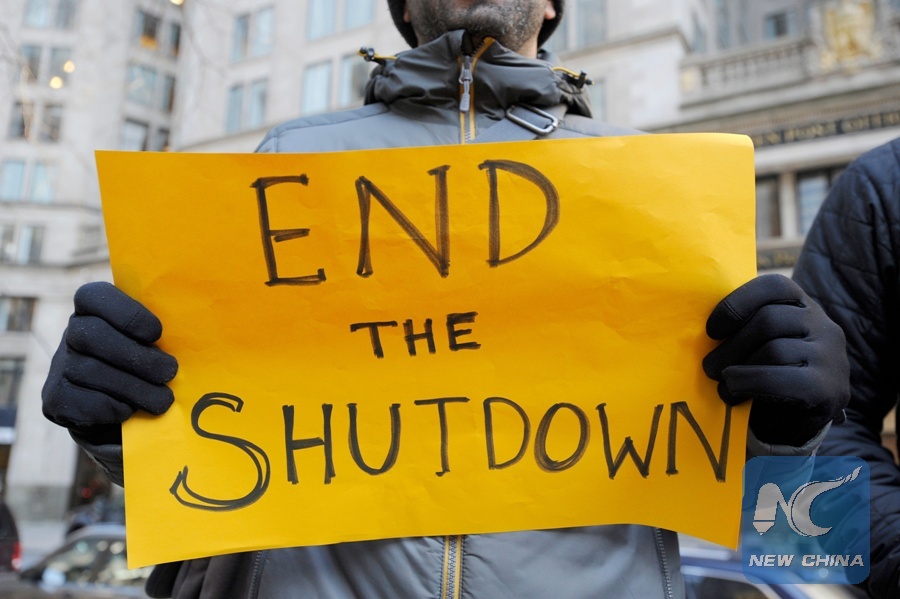
A protester holds a sign during a rally and protest by government workers and concerned citizens against the government shutdown on Jan. 11, 2019 at Post Office Square near the Federal Building, headquarters for the EPA and IRS in Boston. (Xinhua/AFP)
WASHINGTON, Nov. 11 (Xinhua) -- The U.S. federal government entered partial shutdown on Dec. 22, 2018, and reached its 21st day on Friday, tying the record in government shutdown length in recent years.
The U.S. federal government shuts down when the legislative and executive branches fail to agree on a spending bill for government agencies, which halts government operations and furloughs government employees.
The current government shutdown is the result of a disagreement between President Donald Trump and the Democratic Party over the funding for a wall on the U.S.-Mexico border. The most recent negotiation talks collapsed on Wednesday as both sides dug in their heels, yielding no visible ending in sight for the quagmire.
Following is a recap of U.S. federal government shutdowns since 1990.
-- Oct. 6-8, 1990
The U.S. federal government went into partial shutdown on Saturday, Oct. 6, 1990 after some members of the Republican party opposed an agreement reached by then President George H.W. Bush and Democrats to raise taxes. The opposition blocked a spending bill in Congress as the new fiscal year started, causing a temporary spending gap for certain government agencies.
As the shutdown occurred during a holiday weekend, actual impact of the shutdown was limited. The Environmental Protection Agency, Department of Labor, Office of Personnel Management, and Department of Housing and Urban Development went into full shutdown and the Library of Congress, Government Printing Office, and the Departments of Energy, Interior, and State were partially closed. During the shutdown, the Department of Interior furloughed about 2,800 workers, the Library of Congress around 100, and the other agencies fewer than 10 each.
-- Nov. 14-19, 1995
Then Democratic U.S. President Bill Clinton and the Republican-controlled Congress did not agree on a budget bill when a new fiscal year started in October 1995. Republicans wanted to slow government spending while Clinton argued for more funding for education, the environment, medicare and public health. The difference eventually led to a shutdown.
About 800,000 federal government employees were furloughed as a result of the shutdown.
-- Dec. 16, 1995 - Jan. 6, 1996
The record-breaking 21-day government shutdown was the sequel to the previous government shutdown, which ended with a fragile truce between Clinton and the Republicans.
As the shutdown lengthened, public opinion turned against Republican lawmaker Newt Gingrich, the then House speaker who led the fight against the Democrats. The two sides eventually hammered out an agreement with modest spending cuts and tax increases.
Despite the longer shutdown, less government institutions and employees were impacted compared with the one a month earlier. About 284,000 government employees were furloughed and the total estimated cost to the government for the two shutdowns together was about 400 million U.S. dollars.
-- Oct. 1-17, 2013
The Republican-led House of Representatives and the Democrat-led Senate and then U.S. President Barack Obama conflicted over funding for the Patient Protection and Affordable Care Act, a piece of signature legislation for Obama better known as Obamacare, leading to impasse on a budget bill for the fiscal year 2014.
The deadlock put the federal government into shutdown on Oct. 1. During the shutdown, Republicans made at least three proposals to renew funding for the government, under the condition of curtailing Obamacare. The proposals were rejected by the Democrats.
The standoff ended when the the U.S. government faced the risk of defaulting on its debts, which would seriously damage its credibility. Both sides reached an agreement at the 11th hour to avoid default.
About 800,000 federal government employees were furloughed as a result of the shutdown.
-- Jan. 20-22, 2018
Dispute over the future of children of illegal immigrants erupted one year after Trump entered into office and left the federal government unfunded for three days.
The Trump administration wanted to terminate the Deferred Action for Childhood Arrivals program, which granted legal residence status for minors who entered the country illegally with their guardians, but was opposed by the Democrats.
As a result of the shutdown, approximately 692,900 federal employees were furloughed.
Differences on funding for a border wall on the U.S. southeastern border also partially contributed to the shutdown, foreshadowing the current spending gap.

